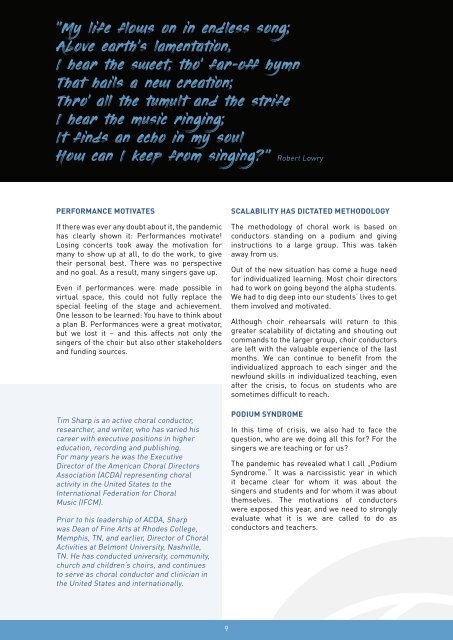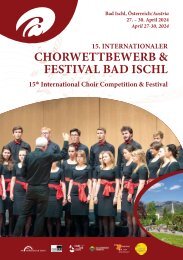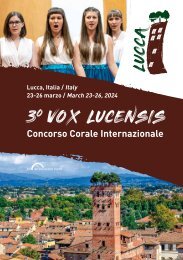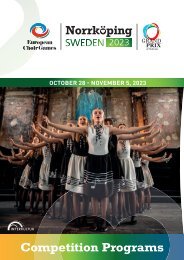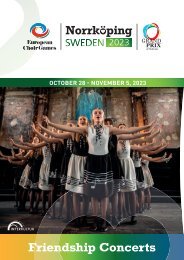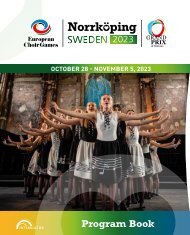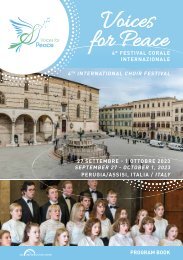COUNCIL TALK 02/2021 - The digital magazine of the World Choir Council
The digital magazine COUNCIL TALK is the magazine of the INTERKULTUR World Choir Council – in exchange with the choir world. It is published twice a year at the end of January and August. In addition to reviews of the projects and meetings of the World Choir Council, the magazine focuses primarily on current issues and challenges of the choral scene.
The digital magazine COUNCIL TALK is the magazine of the INTERKULTUR World Choir Council – in exchange with the choir world. It is published twice a year at the end of January and August.
In addition to reviews of the projects and meetings of the World Choir Council, the magazine focuses primarily on current issues and challenges of the choral scene.
- No tags were found...
Create successful ePaper yourself
Turn your PDF publications into a flip-book with our unique Google optimized e-Paper software.
„My life flows on in endless song;<br />
Above earth’s lamentation,<br />
I hear <strong>the</strong> sweet, tho’ far-<strong>of</strong>f hymn<br />
That hails a new creation;<br />
Thro’ all <strong>the</strong> tumult and <strong>the</strong> strife<br />
I hear <strong>the</strong> music ringing;<br />
It finds an echo in my soul –<br />
How can I keep from singing?” Robert Lowry<br />
PERFORMANCE MOTIVATES<br />
If <strong>the</strong>re was ever any doubt about it, <strong>the</strong> pandemic<br />
has clearly shown it: Performances motivate!<br />
Losing concerts took away <strong>the</strong> motivation for<br />
many to show up at all, to do <strong>the</strong> work, to give<br />
<strong>the</strong>ir personal best. <strong>The</strong>re was no perspective<br />
and no goal. As a result, many singers gave up.<br />
Even if performances were made possible in<br />
virtual space, this could not fully replace <strong>the</strong><br />
special feeling <strong>of</strong> <strong>the</strong> stage and achievement.<br />
One lesson to be learned: You have to think about<br />
a plan B. Performances were a great motivator,<br />
but we lost it – and this affects not only <strong>the</strong><br />
singers <strong>of</strong> <strong>the</strong> choir but also o<strong>the</strong>r stakeholders<br />
and funding sources.<br />
Tim Sharp is an active choral conductor,<br />
researcher, and writer, who has varied his<br />
career with executive positions in higher<br />
education, recording and publishing.<br />
For many years he was <strong>the</strong> Executive<br />
Director <strong>of</strong> <strong>the</strong> American Choral Directors<br />
Association (ACDA) representing choral<br />
activity in <strong>the</strong> United States to <strong>the</strong><br />
International Federation for Choral<br />
Music (IFCM).<br />
Prior to his leadership <strong>of</strong> ACDA, Sharp<br />
was Dean <strong>of</strong> Fine Arts at Rhodes College,<br />
Memphis, TN, and earlier, Director <strong>of</strong> Choral<br />
Activities at Belmont University, Nashville,<br />
TN. He has conducted university, community,<br />
church and children‘s choirs, and continues<br />
to serve as choral conductor and clinician in<br />
<strong>the</strong> United States and internationally.<br />
SCALABILITY HAS DICTATED METHODOLOGY<br />
<strong>The</strong> methodology <strong>of</strong> choral work is based on<br />
conductors standing on a podium and giving<br />
instructions to a large group. This was taken<br />
away from us.<br />
Out <strong>of</strong> <strong>the</strong> new situation has come a huge need<br />
for individualized learning. Most choir directors<br />
had to work on going beyond <strong>the</strong> alpha students.<br />
We had to dig deep into our students‘ lives to get<br />
<strong>the</strong>m involved and motivated.<br />
Although choir rehearsals will return to this<br />
greater scalability <strong>of</strong> dictating and shouting out<br />
commands to <strong>the</strong> larger group, choir conductors<br />
are left with <strong>the</strong> valuable experience <strong>of</strong> <strong>the</strong> last<br />
months. We can continue to benefit from <strong>the</strong><br />
individualized approach to each singer and <strong>the</strong><br />
newfound skills in individualized teaching, even<br />
after <strong>the</strong> crisis, to focus on students who are<br />
sometimes difficult to reach.<br />
PODIUM SYNDROME<br />
In this time <strong>of</strong> crisis, we also had to face <strong>the</strong><br />
question, who are we doing all this for? For <strong>the</strong><br />
singers we are teaching or for us?<br />
<strong>The</strong> pandemic has revealed what I call „Podium<br />
Syndrome.“ It was a narcissistic year in which<br />
it became clear for whom it was about <strong>the</strong><br />
singers and students and for whom it was about<br />
<strong>the</strong>mselves. <strong>The</strong> motivations <strong>of</strong> conductors<br />
were exposed this year, and we need to strongly<br />
evaluate what it is we are called to do as<br />
conductors and teachers.<br />
9


